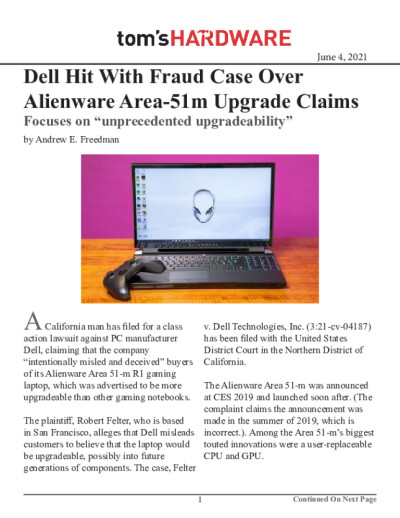A California man has filed for a class action lawsuit against PC manufacturer Dell, claiming that the company "intentionally misled and deceived" buyers of its Alienware Area 51-m R1 gaming laptop, which was advertised to be more upgradeable than other gaming notebooks.
The plaintiff, Robert Felter, who is based in San Francisco, alleges that Dell misleads customers to believe that the laptop would be upgradeable, possibly into future generations of components. The case, Felter v. Dell Technologies, Inc. (3:21-cv-04187) has been filed with the United States District Court in the Northern District of California.
The Alienware Area 51-m was announced at CES 2019 and launched soon after. (The complaint claims the announcement was made in the summer of 2019, which is incorrect.). Among the Area 51-m's biggest touted innovations were a user-replaceable CPU and GPU.
At media briefings, Alienware representatives told the press that the CPU could be upgraded as long as it used Intel's Z390 chipset. The laptop used Intel's 9th Gen Core desktop processors, up to the Intel Core i9-9900K. Dell developed separate proprietary Dell Graphics Form Factor (DGFF) modules for the Nvidia graphics.
The lawsuit, however, claims that consumers were told that "core components" (meaning the CPU and GPU) could be replaced beyond the current generation of hardware.
"Dell’s advertisement to the public didn’t place any restrictions on the upgradeability of the laptop," lawyer David W. Kani said in an email to Tom's Hardware. "They also never disclosed that those with the highest spec CPU and/or GPU that their device would not be upgradeable."
Representatives for Dell said the company's policy is not to comment on pending litigation.
The complaint reads that "Dell’s representations of the upgradability of the Area 51M R1 also extended to units that were equipped with the fastest, most advanced Core Components available to the market, thus creating a reasonable expectation with consumers that the upgradability of the Area 51M R1 extended to yet to be released INTEL CPUs and NVIDIA GPUs, and did in fact create such expectations with consumers." Several times, the complaint refers to Dell's claims of "unprecedented upgradeability."
Those words indeed live on Dell's web page for the Alienware Area-51M R1.
"Gamers have made it clear that they’ve noticed a lack of CPU and GPU upgradability in gaming laptops," it reads. "The Area-51m was engineered with this in mind, finally allowing gamers to harness power comparable to even the highest-performance desktop... CPU upgrades can be done using standard desktop-class processors, while GPU upgrades can be done with GPU upgrade kits available on Dell.com or with the Alienware Graphics Amplifier."
Upgrade kits for the graphics card finally launched in November of 2019 and included options for the Nvidia GeForce RTX 2070 and Nvidia GeForce RTX 2080. Those were the GPUs in the earliest sold Area-51m units, though later ones launched with the weaker RTX 2060 and GTX 1660 Ti. Those with an RTX 2070, could, in theory, upgrade to an RTX 2080, and those with lesser GPUs could move up the chain.
But in May of 2020, Alienware released the Alienware Area-51m R2, a refresh that added support for 10th Gen Intel Core desktop processors and a wider range of GPUs from the Nvidia GeForce GTX 1660 Ti up to the newer Nvidia GeForce RTX 2080 Super and an AMD option, the Radeon RX 5700M.
In June, Alienware laid bare the limits of the upgradeability of both machines. Like the earlier laptop that only supported 9th Gen Intel processors, the new one would only support Intel 10th Gen. The top-end RTX 2080 Super and RTX 2070 Super would be the end of the line of GPUs.
It's the release of the second-generation Area-51m that is the crux of Felter's argument.
"The Area 51M's CPU was not upgradeable to the new INTEL 10th generation CPU, nor was its GPU upgradeable to the new NVIDIA RTX SUPER 2000 series," the complaint states. "In fact, the only way Plaintiff could own a laptop with these newly released upgraded Core Components was to spend several thousand dollars more than what an upgrade would cost to purchase the then-newly released Alienware Area 51M R2 or a similarly equipped laptop from another manufacturer."
In other words: To further upgrade the laptop, Felter would have to buy a new model.
Additionally, the plaintiff and his attorneys claim that because Dell includes Intel and Nvidia components in its machines and has roadmaps in advance, that the company knew the laptop could not be upgraded.
The case is an interesting one in the enthusiast space. At its essence, this boils down to a motherboard with Intel's Z390 chipset as well as the proprietary graphics cards. Motherboards are upgraded at a regular cadence to work with the latest processors, though occasionally new processors will work on older boards. This could potentially set a sort of precedent about how far out a motherboard needs to support a CPU. In desktops, GPUs typically work for years, as long as it's not using an outdated standard. But Dell's graphics were in a proprietary form factor.
Felter is seeking damages, relief and attorneys fees for himself and those in Alaska, Arizona, California, Hawaii, Idaho, Montana, Nevada, Oregon, and Washington state who purchased the laptop on their own since its release in 2019. He is represented by attorneys Brian H. Mahany of Mahany Law and Steven I. Hochfelsen and David W. Kani of Hochfelsen & Kani, LLP. He is asking the court for a jury trial.
